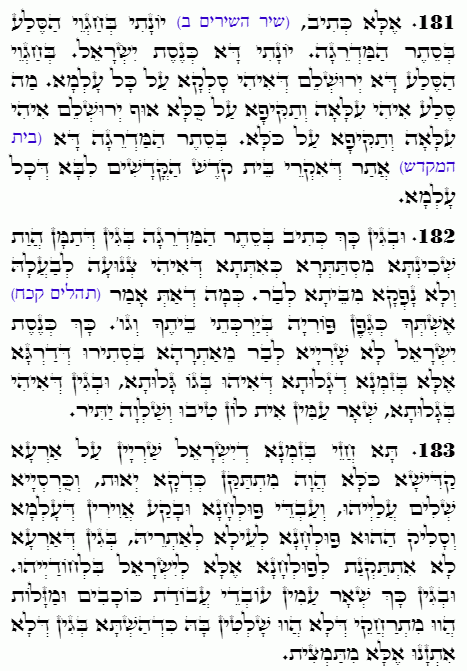Daily Zohar # 4698 – Lech Lecha – My dove in the clefts of the rock
Daily Zohar 4698

Hebrew translation:
182. וּמִשּׁוּם כָּךְ כָּתוּב בְּסֵתֶר הַמַּדְרֵגָה, מִשּׁוּם שֶׁשָּׁם הָיְתָה הַשְּׁכִינָה נִסְתֶּרֶת, כְּמוֹ אִשָּׁה שֶׁהִיא צְנוּעָה לְבַעְלָהּ וְאֵין יוֹצֵאת מִבֵּיתָהּ הַחוּצָה, כְּמוֹ שֶׁנֶּאֱמַר (תהלים קכח) אֶשְׁתְּךָ כְּגֶפֶן פּוֹרִיָּה בְּיַרְכְּתֵי בֵיתֶךָ וגו’. כָּךְ כְּנֶסֶת יִשְׂרָאֵל אֵינָהּ שׁוֹרָה מִחוּץ לִמְקוֹמָהּ בְּסֵתֶר הַמַּדְרֵגָה אֶלָּא בִּזְמַן שֶׁל הַגָּלוּת שֶׁהִיא בְּתוֹךְ הַגָּלוּת. וּמִשּׁוּם שֶׁהִיא בַּגָּלוּת, לִשְׁאָר הָעַמִּים יֵשׁ טוֹבָה וְשַׁלְוָה יוֹתֵר.
183. בֹּא רְאֵה, בִּזְמַן שֶׁיִּשְׂרָאֵל שׁוֹרִים בָּאָרֶץ הַקְּדוֹשָׁה, הַכֹּל הָיָה מְתֻקָּן כָּרָאוּי, וְהַכִּסֵּא שָׁלֵם עֲלֵיהֶם, וְעוֹשִׂים אֶת הָעֲבוֹדָה, וּבוֹקֵעַ הָאֲוִירִים שֶׁל הָעוֹלָם. וְאוֹתָהּ הָעֲבוֹדָה עוֹלָה לְמַעְלָה בִּמְקוֹמָהּ, מִשּׁוּם שֶׁהָאָרֶץ לֹא הִתְתַּקְּנָה לָעֲבוֹדָה אֶלָּא לְיִשְׂרָאֵל לְבַדָּם. וּמִשּׁוּם כָּךְ שְׁאָר הָעַמִּים עוֹבְדֵי עַכּוּ”ם הָיוּ מִתְרַחֲקִים, שֶׁלֹּא הָיוּ שׁוֹלְטִים בָּהּ כְּמוֹ עַכְשָׁו, מִשּׁוּם שֶׁלֹּא נִזּוֹנוּ אֶלָּא מֵהַתַּמְצִית.
.
Zohar Lech Lecha
Continued from previous DZ
#181
And he answers with the verse, “יוֹנָתִי בְּחַגְוֵי הַסֶּלַע בְּסֵתֶר הַמַּדְרֵגָה” “My dove in the clefts of the rock, in the secret places of the cliff” (Song of Songs 2:14). “My dove” refers to the Congregation of Israel, which is the Shechinah. “In the clefts of the rock” refers to Jerusalem, which is higher than all other places in the world. Just as a rock is elevated and robust above all else, Jerusalem is elevated and robust above all, too. “In the secret places of the cliff” is the place called the Holy of Holies, the heart of the entire world.
Notes:
The Zohar highlights the sanctity of Jerusalem and the Temple, portraying them as the highest and most resilient points of connection between Hashem and the earthly realms. The passage reminds us of the centrality of sacred spaces and the Shechinah’s role in maintaining the link between Hashem and Israel.
#182
Therefore, it is written, “בְּסֵתֶר הַמַּדְרֵגָה” “in the secret places of the cliff” in reference to the Holy of Holies, because the Shechinah would hide there, like a modest wife who stays in her home and does not go out. As it says, “אֶשְׁתְּךָ כְּגֶפֶן פּוֹרִיָּה בְּיַרְכְּתֵי בֵיתֶךָ” “Your wife will be like a fruitful vine within the innermost parts of your house” (Psalms 128:3). Similarly, the Congregation of Israel does not dwell outside her place, which is in the secret places of the cliff, except during times of exile, when she is within the exile. And because she is in exile, the other nations enjoy prosperity and tranquility more than Israel.
#183
Come and see: When Israel dwelled in the Holy Land, everything was established as it should be, and the Throne, which is the Nukva, was complete over them. This means that the Nukva served as a complete throne for the Upper aspect of Israel (Zeir Anpin), and they served Hashem, meaning they raised Mayim Nukvin (feminine waters). This act pierced through the spiritual layers of the world, and their service ascended to its place, reaching Zeir Anpin and Nukva, causing them to unite. The land is suited for worship only by Israel alone.
Therefore, the other nations kept their distance from the land and did not have dominion over it as they do now. The nations were sustained only by the remnants of the flow of Light that Israel drew through their service. However, the main blessing of abundance reached Israel, while the nations received only the residual. As a result, Israel held dominion over the land.
Notes:
The Zohar illustrates how Israel’s presence and service in the Holy Land created a divine flow that blessed both Israel and the surrounding nations. By completing Nukva through worship, Israel enabled a union with Zeir Anpin, facilitating the primary flow of abundance to themselves and, residually, to the nations. This unique spiritual role granted Israel a special connection and dominion over the land, reinforcing the importance of dedicated worship and following the Torah. The passage emphasizes the power of sincere service to elevate and sustain both oneself and the world, reflecting the value of spiritual dedication and connection to sacred places.
{||}

 Previous: Lech Lecha
Previous: Lech Lecha

